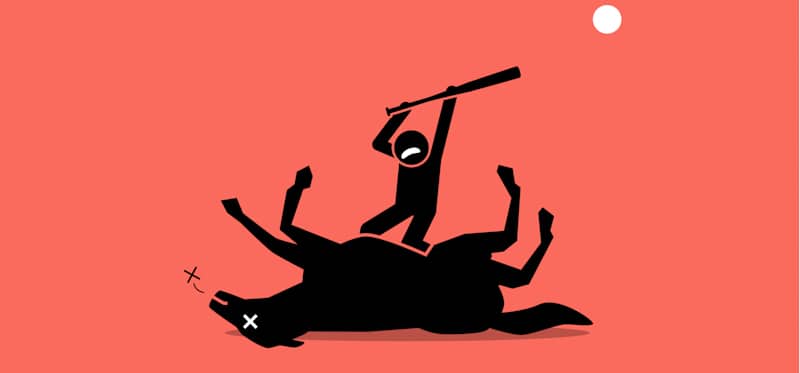A horse is one of the most agile land-based animals on the planet. The four-legged, hairy creature represents or is synonymous with speed, strength, beauty, and power. But when a horse is dead or has passed its prime, it’s pretty much done for good or won’t serve its master like it used to.
The phrase “don’t beat a dead horse” means “to not bring up an issue that’s already discussed to no avail”. Though the term can be adopted in sentences for its literal meaning, it’s invariably employed to denote any matter, subject, or even a person that’s not worthy of further talks or introspection.
Keep reading if you’d like to learn more about the idiom’s meaning, the origin of the phrase, how it gets used in texts (with several example sentences), and a host of other related information. Kindly note, a “dead horse” is more than just an “irrelevant” or “unnecessary” topic of discussion.

“Don’t Beat a Dead Horse” – Meaning
Also phrased as “don’t flog a dead horse”, “don’t beat a dead horse” advises “not to put effort into things that will not reap any benefit or cannot show anything for a positive outcome”. In other words, discussing a topic that has been talked about at length already to the satisfaction of everybody involved is “beating a dead horse”.
The idiom’s meaning can also be rephrased as:
- Wasting energy on a thing that has zero chances of succeeding.
- Trying to revive interest or curiosity in a thing that has already died out.
Though not exactly synonymous or replacement terms for the phrase, words such as “belabor”, “harp on”, “dwell upon”, “dwell on”, etc., are quite similar in meaning to the “dead horse” expression.
What Does the Phrase “Dead Horse” Mean?
The term “dead horse” denotes anything that’s not relevant or useful anymore. The phrase can be used in texts as a standalone saying. But generally, it’s mainly used in the famous expression.
The term is used in the military to describe a matter that has been looked into multiple times before. The connotation is identical to what the symbolic meaning of the phrase is, generally.
Interestingly, “dead horse” could also be used to describe an individual who tends to decline invites to an event or a social gathering for no real reason. The person usually has all the time to attend the said event but chooses not to because they are simply not keen.
People who have passed out due to overconsumption of alcohol or do not cooperate during sex and just lie on the bed acting dead could also be referred to as “dead horses”.
In salvage trading, the “dead horse” term could signify any item with no or little monetary value. The owner of the good just wants to wash their hands of it. For example, old computers from the late ’80s that aren’t working anymore are considered “dead horses” in the salvage trade market.
The supposed “dead horse” is disassembled or broken down into parts to check if there’s something of value in it. The best components or those with intrinsic monetary value could get referred to as “horse meat”. The ones that aren’t of much importance but not complete trash at the same time could be called “dog food”.
Origin of the Expression “Don’t Beat a Dead Horse”
John Bright, the English orator, and politician popularized the expression. In March 1859, Lord Elcho, during his speech in the lower house of the UK parliament, said Bright was not happy with Elcho’s winter campaign results and likened his efforts to “flogging a dead horse”.
Bright, however, didn’t coin the phrase. The earliest mention of the idiom can be found from 1872 in the Oxford English Dictionary, citing The Globe newspaper’s reporting on the futile efforts of the then prime minister, William Gladstone.
A few scholars claim the idiom goes back to the 17th century, a time when a horse was viewed as an emblem of hard work.
The “Horse” Metaphor
Horse racing has given birth to or inspired several idioms and phrases in English. “Don’t beat a dead horse” most likely also has its roots in the sport.
In horse racing, the jockey uses a whip to hit or “motivate” the horse to run faster. The horse is alive and is, therefore, able to respond to the jockey’s call steadfastly. But no lashing or urging will make a “dead” horse regain life and sprint.
In other words, there’s no point beating a dead horse (dead by spirit), and this is where the inspiration for the expression could have come from.

Using the Phrase “Don’t Beat a Dead Horse” in Texts
The phrase has been commonly used in political contexts, as clearly mentioned above. For example:
- Asking for another round of votes recounting is merely beating a dead horse.
However, over a period, its usage spread to other walks or spheres of life, including public discourse and general conversations.
The phrase can be used informally, for example:
- Don’t beat the dead horse, for it has already been talked about and decided.
Kindly note, the phrase can be used with or without “don’t” in texts. Either way, the term implies “waste of time”, “efforts in vain”, etc.
As mentioned above, “flogging a dead horse” or “don’t flog a dead horse” are alternate phrases for the idiom. The term “flogging” is simply another way of saying “beating”. Therefore, using the alternate expression is perfectly acceptable or won’t change the meaning of a sentence. Here are a few example sentences with the phrase:
- There’s no point investing money in the company and keeping it alive. We are just flogging a dead horse.
- I have told her to start scheduling things to be more productive. But looking at how she has been responding to my calls, I think I was flogging a dead horse.
Using Just “Dead Horse” in Texts
When employed in texts by itself, the term “dead horse” could be used figuratively or for its literal meaning. In other words, the phrase could be referring to an actual horse that’s dead.
But since “dead horse” also has a symbolic meaning, it could be used in texts as a standalone phrase and still mean what the expression “beating a dead horse” implies. For example:
- That dead horse was beaten already, unfortunately.
In the sentence above, “dead horse” could refer to a real horse or an issue that’s not worth discussion.
Here are a few sentences wherein “dead horse” implies an “oft-discussed issue”:
- It’s a dead horse. Shall we discuss more pertinent topics for a change?
- Why do you keep bringing up the dead horse when you know the effort and time spent on it will not take us anywhere?
Since “dead horse” could also denote a person who’s not too keen to attend an event or gathering (as mentioned above), the phrase could be used in texts to mean an individual. For example:
- Where is Tom? He said he’ll come to the party tonight. I suppose he is playing dead horse again.
Other Interesting Idioms
Example Sentences with the Term “Don’t Beat a Dead Horse”
As mentioned above, the “dead horse” expression could have “don’t” or may not use “don’t” when incorporated in texts. The following sentences, therefore, could have either version of the phrase:
- She is continually trying to get her book published. But I believe she’s just beating a dead horse.
- You are just beating a dead horse, persuading her to come out with us – she doesn’t like going out late in the evening.
- You may continue urging him to quit and join your firm. He is quite content with his current job. Don’t beat a dead horse!
- The professor was beating a dead horse, advising students not to use smartphones all the time and that using the phone for an extended period can hurt them in the long run.
- We’ll go on a vacation only next year. So, stop beating the dead horse, asking me to prepone the plan.
- Why are you bringing up these done and dusted issues again? You are just beating a dead horse.
- Comparing a Ferrari with any car that’s less than half its price and putting forth an argument that the less expensive vehicle is the more powerful vehicle of the two is beating a dead horse.
- Pretty much everybody has moved on. You are the lone one who’s beating the dead horse.

Conclusion
People generally “beat a dead horse” or try to revive a topic or bring it up for discussion again because they may want the issue to be looked at from an angle that wasn’t considered before. However, for the revival attempt to be successful, other people should see the point or deem the other perspective as worthy.
The likelihood of rekindling the matter is little, particularly if the concerned have moved on and have other issues to worry about. In such cases, trying to reawaken the subject is akin to “beating a dead horse”. In other words, “do not beat a dead horse” if it has lost its steam already.
Shawn Manaher is the founder and CEO of The Content Authority. He’s one part content manager, one part writing ninja organizer, and two parts leader of top content creators. You don’t even want to know what he calls pancakes.

